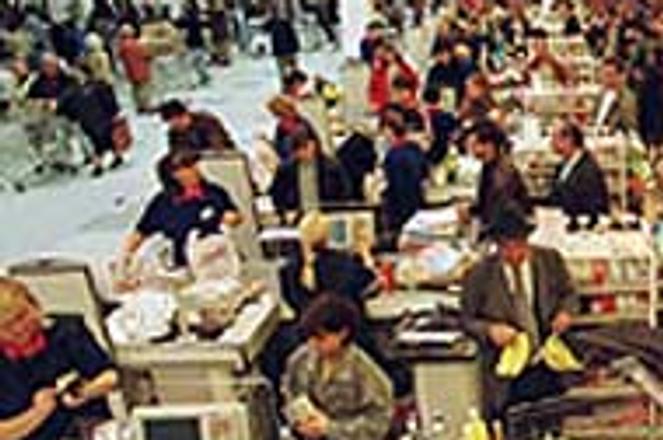Košice opened a Tesco store on October 12, 1999; there, as elsewhere, big stores are winning converts.photo: TASR
When hypermarket chain Carrefour opened its massive new Petržalka store on June 14, it was swarmed by curious shoppers seeking low prices and wide selection - things people said they couldn't find in local grocery stores. With other Petržalka hypermarkets owned by Tesco and Jednota expected to open their doors in the near future, convenience and price are expected soon to define the shopping habits of Slovak consumers.
The arrival of the hypermarkets - which offer a massive variety of goods ranging from clothes to food to electronics under a single roof - represent a new experience for Slovak shoppers, one that until now was only available abroad. As late as this year, Slovaks had been flocking to Czech and Austrian superstores to stock up on supplies, but the presence of Carrefour is now keeping many of these bargain hunters at home.
Bratislava residents Petra Nemčeková and Anne Marie Stefankovičová, interviewed at Carrefour on June 20, said they were relieved they no longer had to go to Vienna to get what they wanted.
"I like that the store is here because when I'm shopping downtown, I have to go to a lot of different stores to get the different things that I need. This is large with lots of supplies and food and is a lot more like shopping in Vienna," Nemčeková said.
While low prices make hypermarket shopping attractive, some Slovaks say the crowds make the experience an unpleasant one.
"It's nothing special," said Lucia Korčeková. "The prices are decent, but there are so many people and it's really not very nice inside compared to the shops in Vienna or Brno in the Czech Republic. The lines are long and there is nowhere to sit inside."
But despite the mixed reviews, convenience and low prices will surely make converts of Slovak shoppers, according to Ján Tóth, head analyst for the Dutch investment bank ING Barings.
"The growth that we are going to see with the hyperstores over the next two years will be huge. This is easy to predict when you compare Slovakia with the superstores in the Czech Republic, Poland and Hungary. In the past, Slovakia had Tesco and nothing else, but now of course we are going to catch up."
Tóth explained that Slovakia's worsening standard of living meant that more than ever before, consumers would be looking for price bargains above all else. After real wages declined 3.1% in 1999, they fell a further 6.1% during the first three months of 2000 compared to the same period last year.
Not only would hypermarkets offer cheaper groceries for consumers, Tóth continued, but they would also have a positive effect on inflation, which has been at 13-15% for the last 18 months after a series of economic austerity packages.
"The hypermarkets are great news for consumers. I expect they might lead to around a 5-7% drop in the cost of foodstuffs in the next one and a half years if there are no other factors, such as a drought," Tóth said, adding that food represents about one-third of the consumer basket used to calculate inflation. More variety and better services such as money-back guarantees and friendly store clerks were also positive offshoots of the proliferation of hypermarkets, he added.
Despite the early enthusiasm, bigger is not always better, as many small towns in the West have already discovered in the wake of their own hypermarket explosions.
In the 1980s and 1990s, Wal-mart superstores awoke criticism and fear across North America as they put many smaller local merchants out of business with their low prices - prices achieved by squeezing both suppliers and the salaries of store employees. Faced with the prospect of a Wal-mart store that would have equalled its combined total retail space, the town of Ashland, Virginia (pop. 7,500) this year managed to convince the chain to cut its planned space in half.
However, Ashland town manager David Whitlow said that small businesses in town still feared the arrival of the hypermarket.
"There has been some concern that this big retailer will come in and small owners will be run out of business because they won't be able to compete price-wise or with the hours of operation," Whitlow said. "The Wal-mart will operate 24 hours a day, seven days a week and a lot smaller merchants don't want to have to compete with that. If a merchant wants to survive, they are going to have to carve out a niche, and I've heard a number of merchants say that they plan on switching their product lines so that they are not in direct competition with Wal-mart. They will look for other areas."
The same niche marketing that has come to define the shopping experience in the US will inevitably take place in Slovakia as well. It's a process that Ján Bunčák, assistant sociology professor at Bratislava's Comenius University, describes as part of the evolution of shopping.
"With the opening of Carrefour, Slovakia has seen the very first mechanism - which is well known in western Europe and the US - that will lead to some sort of change in the shopping patterns of the country's inhabitants," said Bunčák. "Now the most important factor is price, but the next step will be the 'style' of shopping, where price is not the most important aspect. These hypermarkets are help to introduce the new style, and the situation will evolve into shopping malls, which are now under preparation in Slovakia."


